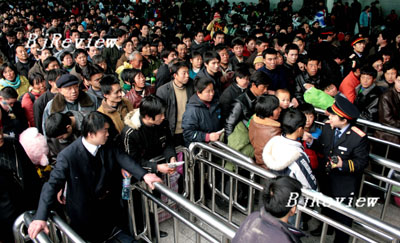
China has far too many people. It’s too crowded here. And everywhere I go, whether by foot, on bike or in a vehicle, I always encounter a bottleneck somewhere along the line. Waiting to walk through a ticket gate to get on a train, trying to enter the metal gates of my university or even traveling by car and encountering
toll booths blocking the road--all of these routes have multiple openings, various passageways--yet invariably only one will be open. People, bikes and cars will swarm, crowd, and congregate upon this entryway, trying to get through. When I ask my Chinese friends why only one gate is open they often answer, “Because we have only one guard.” This makes no sense at all to me, for even busy indoor markets and shopping centers will barricade all but one side door where numerous greeters hover around like butterflies. Train stations, too, are always packed with uniformed attendants. Perhaps this cultural phenomenon mirrors a predilection for Chinese to comfortably crowd together. Certainly, the way Chinese delegate space and time significantly differs from Western norms.
Likewise, Chinese body language in a spatial context is misleading. My boss, for example, often snuggles rather too close next to me in taxis. She adamantly grips my arm as if I’m her darling daughter rather than a minor minion and employee. Moreover, this cuddling doesn’t signify that she even likes me; indeed, it is just the opposite. I think I am simply a foreign object to be manipulated and cultivated for maximum work production under the egress of international friendship.
Yet at the other end of cultural discrepancy I frequently survey Mrs. Wang in stunned silence. A desk clerk at my residence hotel, my friend shocks me every time she routinely snuggles up in a single cot bed with her 15-year-old son during the siesta hour. I’m sure that she has never thought this curious closeness to be any more than normal family intimacy.
How close is too close? Certainly it depends on whose social rules you follow. Take body language, for example. It is difficult to convince my eager 52-year-old American boyfriend that kissing me hello at the airport is not apropos. “The young Beijing kids do it,” he complains. “They hold hands, smooch, and embrace. Why are you so cold; haven’t you missed me?”
“But we are older, we must be mature and keep our dignity,” I primly reply. “We are in China. It is unseemly, especially at our age. Wait till we get home.”
But other societal differences regarding physical needs have deeply disturbed me in China. I was utterly astonished to have a student briskly follow me into an open toilet stall to ask a question. “Not here, not now,” I stuttered, blushing from my neck to my forehead. Additionally, my embarrassment climaxed at our local bathhouse when I discovered I was showering publicly with colleagues and students; no one seemed to lose their dignity but me.
Here personal space and privacy do not conform to Western standards. This does not mean that Chinese are not private; in fact they are intensely private people with a very sophisticated sense of decorum and etiquette. Business, friendships, even family relationships have specific hierarchies and standards of behavior. But almost everything physical other than the sex act seems to require scant seclusion. Furthermore, to Western eyes the affection between the same sex often appears more endearing and loving than romantic relationships, and even almost perverse at times. “What we love the most we keep secret,” one Chinese friend confided to me recently. “To display it to the world is more than vulgar; it is insulting to the beloved. Friendships are deep but not as profound as a love affair.” This concept is poles apart from a Frenchman, who ardently displays his passion in public. In this way the French couple receives a kind of societal benediction, a civic validation of their special sentiment.
Chinese relationships of all kinds, not just marriages, are built to last. China still is not a mobile society. People here hope to have one job, one career, one spouse. Stability and avoidance of conflict represent success. “You Western people want everything done right now. You think time is money. We Chinese beg to differ. For us timing is precious; time itself is endless,” a colleague told me.
The author is an American working in Inner Mongolia
CORRECTION: The author of KTV: The Sounds of Music (published in Issue Vol.50 No.18 of Beijing Review, May 3, 2007) should be AARON A.VESSUP. We regret the error.
| 